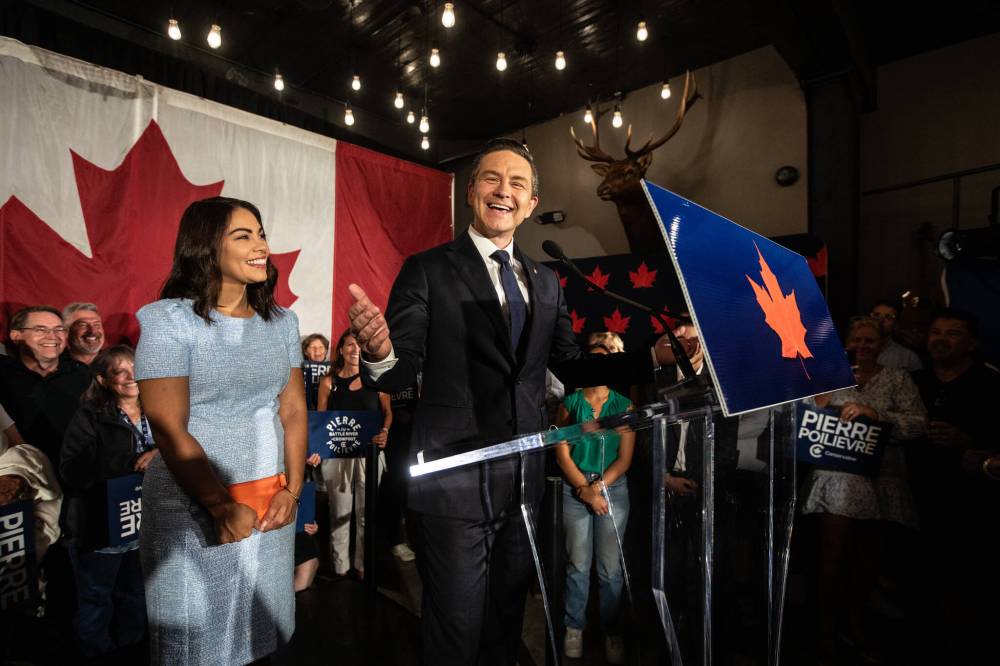Poilievre faces a new fight in Ottawa
Advertisement
Read this article for free:
or
Already have an account? Log in here »
To continue reading, please subscribe:
Monthly Digital Subscription
$1 per week for 24 weeks*
- Enjoy unlimited reading on winnipegfreepress.com
- Read the E-Edition, our digital replica newspaper
- Access News Break, our award-winning app
- Play interactive puzzles
*Billed as $4.00 plus GST every four weeks. After 24 weeks, price increases to the regular rate of $19.00 plus GST every four weeks. Offer available to new and qualified returning subscribers only. Cancel any time.
Monthly Digital Subscription
$4.75/week*
- Enjoy unlimited reading on winnipegfreepress.com
- Read the E-Edition, our digital replica newspaper
- Access News Break, our award-winning app
- Play interactive puzzles
*Billed as $19 plus GST every four weeks. Cancel any time.
To continue reading, please subscribe:
Add Free Press access to your Brandon Sun subscription for only an additional
$1 for the first 4 weeks*
*Your next subscription payment will increase by $1.00 and you will be charged $16.99 plus GST for four weeks. After four weeks, your payment will increase to $23.99 plus GST every four weeks.
Read unlimited articles for free today:
or
Already have an account? Log in here »
Pierre Poilievre is headed back to Parliament Hill — but it won’t be the same one he remembers.
The federal Conservative leader, fresh off a byelection victory in Alberta’s Battle River-Crowfoot riding, will finally retake his seat as leader of the Official Opposition when Parliament resumes this fall. But when Poilievre returns to the halls of the national legislature, he will no doubt find it a changed environment.
The pressure to thrive in that environment will be high for the Conservative leader, who faces a mandatory leadership review next year. So far, the Conservatives have been happy with Poilievre — but that can always change.

The Canadian Press
Conservative Leader Pierre Poilievre
On the policy front, his base should be happy: he has said he will push a Canadian sovereignty law once back in the House, a bill which proposes counter tariffs to resist U.S. pressure, as well as the construction of new pipelines and a natural gas liquefaction plant on the energy front.
However, part of his problem is that a gung-ho attitude about fossil fuel development does not actually set him apart from the other side of the aisle that much anymore. Prime Minister Mark Carney has himself spoken positively of pipelines — stating in July that a new oil pipeline in British Columbia is likely to appear among future projects. Once sworn in as PM, even prior to the election, Carney promptly ended the consumer carbon tax — opposition to which had been the crown jewel in Poilievre’s earlier public messaging.
Justin Trudeau is not there to kick around anymore, and Trudeau’s successor’s instincts are less left-leaning to the point some observers — including Free Press contributor David McLaughlin — have described him as similar to an old-school progressive conservative.
If Poilievre cannot find a way to distinguish himself and his party from Carney’s government on substantive matters of policy, he may end up retreating into more shallow, culture-war fronts (as he has already done on issues such as transgender women in sports) which will only serve to shrink the Conservative base in the long run.
Poilievre, of course, will be able to lean on a few reliable moves: pinning the blame on the ruling party for most Canadians’ woes, whether it be inflation, housing costs or deteriorating infrastructure. Such is the role and lot of an Opposition leader: to demand answers when things are going badly for Canadians. Poilievre will have a chance to do plenty of that.
But his style, if unchanged, is unlikely to sway more Canadians to his side. Poilievre in the time of Trudeau stoked politics of division, harnessing a deep distrust and dislike of the federal Liberals and riding a wave of us-versus-them hostility. But in a time when Canada’s very sovereignty has come under threat by an erratic American president, a new spirit of pan-Canadian solidarity has emerged. That doesn’t mean political rivalry no longer exists, but the events of the past eight months have made it clear that Canadians are “all in this together” in a whole new way.
Considering how his perceived similarities to U.S. President Donald Trump may have played a role in dashing his chances at becoming prime minister, a change of strategy — and tone — would serve him well.
The Conservatives have extended to Poilievre a great deal of goodwill already — keeping him on as leader post-election despite the embarrassment of failing to secure his own seat, and making way for him in a new one.
If he does not find a way to effectively do battle on this new ground when that leadership review comes around, he may soon find himself as the recently elected MP of Battle River-Crowfoot — and nothing more.


